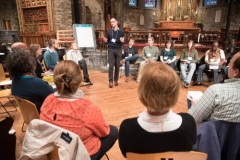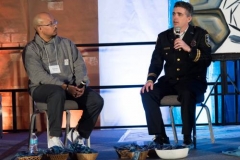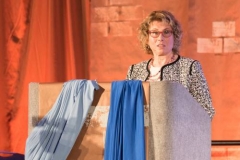Workshops and keynote speaker give insights to church’s role in the current cultural context
May 2, 2017
The 550 attendees of the 2017 NEXT Church National Gathering in March were treated to inspiring testimonies, over a dozen workshops, worship opportunities and a discussion on the “spiritual but not religious” research of the Rev. Dr. Linda Mercadante as the conference concluded its first day and began the second.
Jen Kottler and Leslie Mott presented their work on “Transformative Learning” and encouraged the use of spiritual disciplines to allow time for reflection and adaptation to better inform a response based on Christian teaching and the “yearnings of the Spirit.”
A joint testimony by Charlie Scoma, a chaplain with the Seattle Police Department, and Glenn McCray, director of community development with Urban Impact, challenged attendees to rethink presuppositions about police and community relations.
Two of the gathering’s five Ignite Presentations showed attendees the possibilities found in organizing around race and justice issues. Rebecca Davis, professor of Christian education and religion at Presbyterian College, was joined by students Jacob Kennedy and Joaquin Ross to discuss their work on the campus. John Wilkinson spoke to the work of “Peace for Peoria.”
Workshops included a conversation on “Spacious Christianity: Church in the None and Done of the Pacific Northwest” led by Steven Koski and Jenny Warner of First Presbyterian Church in Bend, Oregon.
The terms “none” and “done” are applied to those who have grown up with no religious exposure and those who have made a conscious decision to leave organized religious experience. The duo discussed the cultural context of the Pacific Northwest, where the move toward these expressions, part of the “spiritual but not religious” (SBNR) movement, has been more rapid than in other parts of the country.
Referring to a first-time church attendee’s request to be baptized, Warner said, “We found that the church needs to say ‘yes’ more often. ‘Yes’ has become a model for how we do ministry.”
The discussion on the “nones” and “dones” parlayed into an evening keynote address by Mercadante, Straker Professor of Theology at Methodist Theological School of Ohio, who cited research from her book Belief Without Borders: Inside the Minds of the Spiritual but not Religious.
Mercadante showed the rapid rise of the religiously unaffiliated that has mushroomed from 36.6 percent in 2007 to 55.8 percent in 2014. She said the theory that young adults fall away from the church during college and return once they get married and have children is false. Unaffiliated young adults have risen from 10 percent in 1986 to at least 39 percent in 2016.
“People feel it implicitly that we are at a historic turning point,” she said of this trend. “If the church doesn’t respond to this, we’re going to be in a lot more trouble than we are now.”
Mercadante said two pervasive false assumptions have generally guided the discussion about SBNRs: that they believe the church has behaved badly, as seen in sex and financial scandals; and that SBNR individuals are lazy, self-centered, shallow and anti-intellectual.
However, Mercadante noted, key attitudes and behaviors persist in her SBNR interviewees that don’t always mesh well with key concepts of institutional religion. These attitudes and behaviors include the view that all institutions are tainted by wrong values and self-interest and trouble finding institutions that mesh with their spiritual beliefs.
Furthermore, the definitions that those who identified as SBNR gave to the terms “spiritual” and “religious” are telling. For those surveyed, religion is equated with the words institution, dogmatic, exterior and unessential. Spiritual was defined as personal, private, open, individualistic and core.
To them, Mercadante said, these spiritual values “seem more reasonable, praiseworthy, courageous, necessary and acceptable.” There is no shame, she said, in being disaffiliated with a religious institution; rather, it is esteemed as a higher goal.
In the SBNR search for fullness and fulfillment, she proposed, apologists for Christianity need to take current worldviews, culture and philosophy as starting points to begin a discussion on common ground.
NEXT Church defines itself as “a purposeful relational community of Presbyterian leaders whose mission is to strengthen a vibrant and thriving PC(USA) that shares the good news of Jesus Christ in ways that matter to and have impact on God’s evolving world.”
Gregg Brekke, reporter, Presbyterian News Service
Today’s Focus: NEXT Church National Gathering
Let us join in prayer for:
Staff of First Presbyterian Church, Bend, Oregon
Steven Koski, lead pastor
Jenny Warner, pastor for justice, spirituality and community
Morgan Schmidt, director of teens and twentysomethings
Janet Pearson, director of children’s ministries and room organizer
Elizabeth Stephan, care ministries coordinator
Lorraine Stuart, spiritual director
PC(USA) Agencies’ Staff
Mickie Choi, PILP
Jocelyn Chung, PMA
Let us pray:
Lord, let us see you in those we serve and in those who serve others. Amen.
Daily Readings
Morning Psalms 98; 146
First Reading Daniel 4:28-37
Second Reading 1 John 4:7-21
Gospel Reading Luke 4:31-37
Evening Psalms 66; 116


